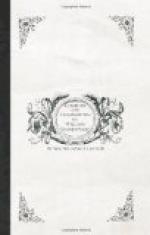“Young man! methinks it is betimes that thou talkest of having a muse to thyself; or even in common with others. It is only great poets who have muses; I mean to say who have the right to talk in that fashion. The French, I hear, Phoebus it and muse-me it right and left; and boggle not to throw all nine, together with mother and master, into the compass of a dozen lines or thereabout. And your Italian can hardly do without ’em in the multiplication-table. We Englishmen do let them in quietly, shut the door, and say nothing of what passes. I have read a whole book of comedies, and ne’er a muse to help the lamest.”
William Shakspeare.
“Wonderful forbearance! I marvel how the poet could get through.”
Sir Thomas.
“By God’s help. And I think we did as well without ’em; for it must be an unabashable man that ever shook his sides in their company. They lay heavy restraint both upon laughing and crying. In the great master Virgil of Rome, they tell me they come in to count the ships, and having cast up the sum total, and proved it, make off again. Sure token of two things,—first, that he held ’em dog-cheap; secondly, that he had made but little progress (for a Lombard born) in book-keeping at double entry.
“He, and every other great genius, began with small subject-matters, gnats and the like. I myself, similar unto him, wrote upon fruit. I would give thee some copies for thy copying, if I thought thou wouldst use them temperately, and not render them common, as hath befallen the poetry of some among the brightest geniuses. I could shew thee how to say new things, and how to time the same. Before my day, nearly all the flowers and fruits had been gathered by poets, old and young, from the Cedar of Lebanon to the hyssop on the wall; roses went up to Solomon, apples to Adam, and so forth.
“Willy! my brave lad! I was the first that ever handled a quince, I’ll be sworn.
“Hearken!
“Chloe! I would not have thee wince
That I unto thee send a quince.
I would not have thee say unto ’t
begone! and trample ’t underfoot,
For, trust me, ’t is no fulsome fruit.
It came not out of mine own garden,
But all the way from Henly in Arden, —
Of an uncommon fine old tree,
Belonging to John Asbury.
And if that of it thou shalt eat,
’Twill make thy breath e’en yet more sweet;
As a translation here doth shew,
on fruit-trees, by Jean mirabeau.
The frontispiece is printed so.
But eat it with some wine and cake,
Or it may give the belly-ache. {153a}
This doth my worthy clerk indite,
I sign,
sir Thomas Lucy, Knight.”
“Now, Willy, there is not one poet or lover in twenty who careth for consequences. Many hint to the lady what to do, few what not to do although it would oftentimes, as in this case, go to one’s heart to see the upshot.”




